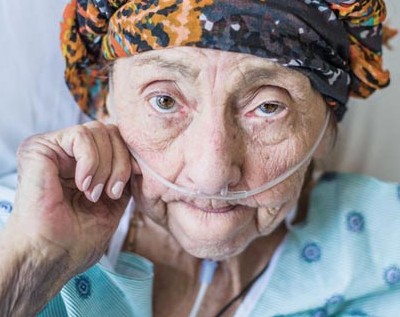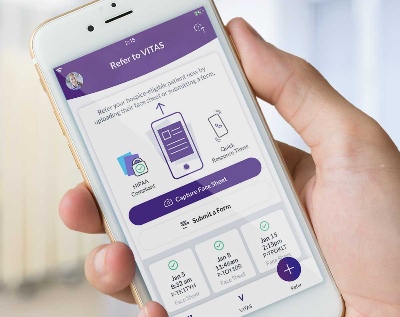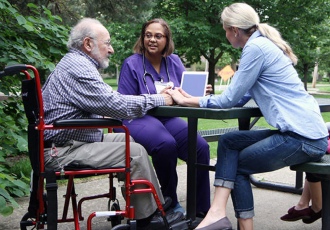By Joseph Shega, MD, Chief Medical Officer, VITAS Healthcare
The holiday season evokes images of family gatherings, gift exchanges, and twinkling lights. In the warm glow of festivities, few associate it with an increase in death.
Yet, a study in Social Science & Medicine points out, "for all settings combined, there are holiday spikes for most major disease groups and for all demographic groups, except children. In the two weeks starting with Christmas, there is an excess of 42,325 deaths from natural causes above and beyond the normal winter increase. Christmas and New Year’s appear to be risk factors for deaths from many diseases."1
Patients who are in the advanced stages of illness are likely more susceptible to further decline during this season. Amid the holiday hustle, clinicians can support family members by anticipating their patients’ needs. For some, hospice services offer next-level clinical care to manage their pain and symptoms and provide multidisciplinary resources.
To supply these services, VITAS hospice teams include a physician, nurse, hospice aide, social worker, chaplain, volunteer, and bereavement specialist. These experts work together to support both the patient and the family.
Importantly, hospice services are provided wherever your patient calls home, be it a private residence, assisted living facility, skilled nursing facility, or elsewhere. This enables people near the end of life to spend this special time of the year with loved ones in an environment they prefer.
Hospice Support for Patients With Advanced Illnesses
Assessing hospice eligibility sooner rather than later is especially helpful during the holidays. Consider that more than one-third of patients live less than seven days in hospice. This means too many patients miss months of care and support which would have enhanced their quality of life near the end of life.
Nothing matters more than the intimate knowledge of individual patient care.
As hospital and long-term care professionals take time off, VITAS hospice care remains available 24/7, 365 days a year, including holidays. This accessibility allows patients with serious illnesses to get consistent quality care from a team of providers.
Laura C., a patient’s loved one from Brevard County, Florida, explains how VITAS has worked for her: “You are assigned to a specific team of real people, in real time, who really know you, your history, your specific care plan, and your wishes any time of the day or night, weekend or weekday, or holiday,” Laura says. “Nothing matters more than the intimate knowledge of individual patient care."
A personalized care plan, coordinated by hospice experts, makes the transition between practitioners in the continuum of care seamless. Our 24/7 availability also helps your patients avoid rehospitalization and stay out of the ED. This, in turn, keeps patients in their preferred setting while the hospital’s quality metrics remain high, reducing lengths of stay and readmission rates.
Assessing Patient Eligibility
What makes a patient with a serious illness hospice-eligible? Consider the following guidelines:
- The patient’s illness is terminal (a prognosis of ≤ 6 months) and the patient and/or family has elected palliative care.
- The patient has a declining functional status as determined by either:
- Palliative Performance Scale (PPS) rating of ≤ 50%-60%
- Dependence in 3 of 6 Activities of Daily Living (ADLs)
- The patient has an alteration in nutritional status, e.g., > 10% loss of body weight over last 4-6 months
- The patient has an observable and documented deterioration in overall clinical condition in the past 4-6 months, as manifested by at least one of the following:
- ≥ 3 hospitalizations or ED visits
- Decrease in tolerance to physical activity
- Decrease in cognitive ability
- Other comorbid conditions
These guidelines are a reference—not a replacement—for a physician’s professional judgment. By law, healthcare professionals must certify that patients meet guidelines to be eligible for a referral to a hospice provider.
If a patient meets the guidelines, timely identification increases the likelihood that the patient and their families will benefit from compassionate, end-of-life care.
Offering Support to Loved Ones as They Cope With Death During the Holidays
If a patient dies, the holidays may heighten the sense of grief and loss for loved ones. Offer support to them by:
- Being present for the family—No matter how you or your staff are feeling, they have lost a loved one.
- Educate those who are mourning to give themselves permission to grieve in their own way.
- Write a personal note to the family.
- Consider attending the funeral—This will be based on the closeness of the relationship with the patient and the family. Some professionals find closure from the process. Families appreciate your presence.
When a Patient Dies in Hospice
Each hospice team includes a chaplain and a bereavement specialist. The chaplain provides pastoral care, including listening, talking, sharing stories, and asking questions. They also reassure, comfort, pray, or read inspirational materials. The chaplain can arrange any support necessary to help navigate non-medical issues and challenges.
The bereavement specialist addresses both anticipatory grief and loss after death. Hospice families receive bereavement support up to 13 months after a death, including consistent contact, support groups, grief education and one-on-one visits.
Here for the Holidays
VITAS knows that the holidays are a sensitive time of year to experience loss. We are here to support healthcare practitioners, patients with serious illness, and their families. To determine if your patient is hospice eligible, use our PPS calculator here.
1Source: Phillips, D., Barker, G., et al: Christmas and New Year’s as Rick Factors for Death. Social Science & Medicine, 71 (8), 2010.


